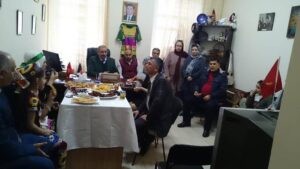KABUL (SW) – In the bustling streets of Mandawi, Kabul’s largest market, the vibrant presence of women preparing for Eid festivities is Irrefutable. Traditionally, and often fueled by their enthusiasm, Afghan women take the lead in readying their homes and families for the joyous occasion of Eid. From meticulously cleaning their households to selecting new attire for themselves and their loved ones, their dedication to the celebration is palpable.
Amidst colorful bolts of fabric and the chatter of vendors, women flock to tailors to fashion bespoke garments for the Eid. For many, like Hadiya Rahmani and Fazila Ahmadi, residents of Kabul, this ritual symbolizes more than just a wardrobe update; it embodies a sense of renewal and communal spirit.
Hadiya Rahmani, navigating the bustling Makroryan market with her family, shares her excitement: “It is very crowded here. Everyone is busy shopping; I also came to the market today, bought myself some clothes in different styles. I bought utensils and items needed for the Eid table. I have done a lot of shopping, and the market is bustling and crowded.”
Fazila Ahmadi elaborates on the significance of Eid preparations: “As Eid is approaching, usually every family has some preparations for it, and I have also prepared for Eid; in terms of cleaning, washing, and also bought some things like dishes for Eid. Of course, everyone has their own specific preparation for Eid, especially women, and Eid with the presence of women is beautiful.”
As the markets brim with activity, the essence of Eid in Afghanistan is epitomized by the tireless efforts of its women. Through their unwavering dedication, they weave a tapestry of tradition, togetherness, and celebration, embodying the spirit of Eid in its truest form. In conversations with a diverse group of 12 women in different areas of Kabul city, each shared their unique perspective on the preparations for Eid.
The Eid preparations is the tradition of cleanliness, symbolizing purity and renewal. Women, the custodians of the home, take on the responsibility of ensuring that their households are immaculately clean and adorned. It is a customary practice for women to embark on a thorough cleaning spree, leaving no corner untouched and heralding the arrival of Eid with a sense of rejuvenation.
Madina, a resident of the 9th district of Kabul city who has been busy cleaning her house since the beginning of Ramadan, says: “As Eid approaches, women are more busy with house cleaning, including myself. Because Eid is near, I have cleaned all the houses, washed the carpets, changed the curtains, bedspreads, and prepared Eid dishes; these are all the chores that young ladies are engaged in.”
Sahar Hakimzada, another resident of the 9th district of Kabul, also says: “I try hard to clean everywhere and to organize everything neatly. If possible, I buy new items so that our house looks beautiful.”
Families in Afghanistan, on their Eid tables, entertain their guests with various fresh and dried fruits, cakes, and cookies. Some women bake homemade cookies before Eid, while others prefer to enhance the beauty of the Eid table by placing floral arrangements in the middle.
Sita Jaihun, a lady who has taken special care in decorating the Eid table, says: “I pay special attention to the Eid table. I decorate my table beautifully with my own hands. I prepare cookies, cakes, sweets, and everything for the Eid table myself. Eid is very valuable; it reconciles people who are upset with each other.”
Zhila, also says: “A day before Eid, we try to prepare some sweets such as Baklava, homemade cookies, and other items that we use to decorate our table. Eid is a creativity for ladies; the more beautiful the table setting, the happier they are.”
While all women want to celebrate Eid to the best of their ability, some of them say that due to economic inability, they cannot prepare for Eid as they wish.
Samira, says: “Eid is for the rich and affluent people. We used to have a job, and Eid used to be pleasant for us; every day you had money, you were wealthy, that day is Eid for you. We do not have money to buy dried fruits, nor do we have any other capital to make our lives better.”
Khatema, also adds: “We have no preparation for Eid. Anything that happens, as soon as the children come out, they say my friend’s mother got herself a new dress, another says my friends went shopping with their fathers, one comes saying my friend got dried fruits; when will we get something?”
Due to the prominent role of women in celebrating Eid, men also appreciate them. Mohsen Khan Tabesh, a resident of Kabul, says: “First and foremost, in our family, the women, our daughters, wives, sisters, and mothers, have the role of household management; they prepare for Eid like decorating the house, cleaning the house, and… all the preparations for Eid are done by women.”
Nevertheless, some women’s rights activists say that due to economic weakness and restrictions imposed on women by the de-facto government, women’s enthusiasm for celebrating Eid has decreased compared to the past.
Yalda Azizi, a women’s rights activist, says: “The benefits we had two years ago during Eid are currently not available. The affections and festivities we had before have faded; because the economic situation of the people has deteriorated significantly, and even girls say on social media that we did not buy Eid clothes. Celebrating Eid has generally become less vibrant.”
However, Zabihullah Mujahid, the spokesperson for the Islamic Emirate, appreciates the efforts and hardships of women in preparing for Eid during the days of Ramadan and congratulates women on the arrival of Eid
He says: “I congratulate Eid to all our compatriots, especially our sisters, on Eid. They have had great efforts in serving their families during this past Ramadan. We pray to Almighty Allah for their full reward, and we wish them a peaceful and comfortable Eid and hope to see future Eids in a safe and peaceful environment.”






